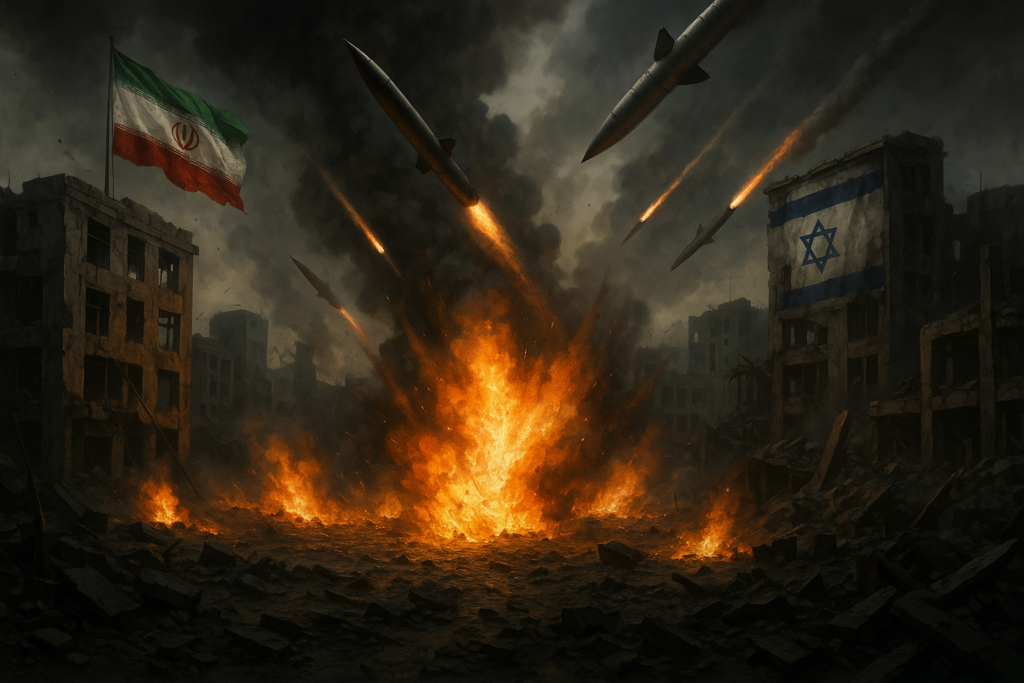Introduction
The Israel and Iran war remains one of the most critical and potentially volatile geopolitical conflicts in the Middle East. Although not officially declared, tensions between the two nations have escalated over decades through proxy battles, cyber warfare, diplomatic hostilities, and military operations. Understanding the roots, current developments, and potential outcomes of this conflict is essential for anyone interested in international relations, security, and Middle Eastern politics.
This comprehensive article delves deep into the Israel and Iran war, covering historical context, recent events, future scenarios.
Table of Contents

Historical Background of the Israel and Iran War
The Pre-Revolution Era (Before 1979)
Before the 1979 Islamic Revolution, Israel and Iran maintained a relatively friendly relationship. Iran, under Shah Mohammad Reza Pahlavi, recognized Israel and engaged in strategic cooperation, particularly against Arab nationalism.
Post-1979 Islamic Revolution
The situation drastically changed after Iran’s Islamic Revolution. The new theocratic regime, led by Ayatollah Khomeini, adopted a vehemently anti-Israel stance, branding Israel as a “Zionist entity” and calling for its destruction. This ideological shift laid the foundation for the modern Israel and Iran war, which has largely played out through indirect confrontations.
Key Triggers of the Israel and Iran War
1. Nuclear Ambitions of Iran
Israel has long regarded Iran’s nuclear program as an existential threat. Accusations of Iran seeking nuclear weapons have led Israel to conduct cyber-attacks (like the Stuxnet virus) and possibly targeted assassinations of Iranian nuclear scientists.
2. Proxy Warfare
Iran supports militant groups such as Hezbollah in Lebanon, Hamas in Gaza, and various militias in Iraq and Syria. Israel has responded with airstrikes on Iranian positions in Syria and elsewhere, heightening fears of a wider regional conflict.
3. Cyber Warfare
Beyond physical confrontations, the Israel and Iran war extends to cyberspace. Both nations have reportedly conducted cyberattacks on each other’s infrastructure, including nuclear facilities, water systems, and oil pipelines.
4. Syria’s Civil War
The Syrian Civil War served as a new battlefield for the two countries. Iran used Syria as a land corridor to arm Hezbollah and entrench itself near Israeli borders, prompting Israeli airstrikes on Iranian assets inside Syria.
Major Events in the Israel and Iran War Timeline
- 2006: Israel fought a 34-day war with Hezbollah, widely regarded as an Iranian proxy.
- 2010: Stuxnet malware, allegedly developed by Israel and the U.S., sabotaged Iran’s Natanz nuclear facility.
- 2018: Israel revealed what it claimed were secret Iranian nuclear archives smuggled out of Tehran.
- 2020: Iranian nuclear scientist Mohsen Fakhrizadeh was assassinated, reportedly by an Israeli remote-controlled weapon.
- 2023–2024: Rising tensions due to Iranian drone and missile development and Israeli strikes in Syria and Lebanon.
The Role of the United States
The U.S. plays a central role in the Israel and Iran war, supporting Israel militarily, economically, and diplomatically. Washington’s withdrawal from the Iran nuclear deal (JCPOA) under the Trump administration and re-imposition of sanctions escalated tensions.
Although the Biden administration attempted to revive the JCPOA, Iran’s growing regional influence and non-compliance with nuclear inspections remain sticking points. Any direct confrontation between Israel and Iran could draw the U.S. into the conflict, with global consequences.
Impact on Regional Stability
1. Gulf Nations
Gulf states like Saudi Arabia and the UAE view Iran as a threat, but they also fear open conflict. Some have strengthened ties with Israel (e.g., the Abraham Accords), seeing it as a counterbalance to Iranian aggression.
2. Lebanon and Hezbollah
Lebanon’s stability is deeply intertwined with the Israel and Iran war, as Hezbollah serves as Iran’s strongest proxy. A full-scale war between Israel and Hezbollah could drag Iran directly into a military conflict.
3. Yemen, Iraq, and Syria
Iran-backed militias in Yemen and Iraq have attacked U.S. and Israeli interests, making these countries key theaters in the broader conflict.
Possible Future Scenarios of the Israel and Iran War
1. All-Out Regional War
If direct attacks between Iran and Israel escalate, a full-blown regional war involving Hezbollah, Hamas, and regional powers could erupt. This scenario would be catastrophic in human, economic, and geopolitical terms.
2. Prolonged Cold War
More likely is a continued cold war-like scenario where cyberattacks, proxy warfare, and diplomatic sabotage persist without open declaration of war.
3. Diplomatic Resolution
Though less likely, diplomatic interventions from major powers or regional peace talks could de-escalate tensions and lead to new security arrangements.
Search Intent FAQs Around Israel and Iran War
What is the Israel and Iran war?
The Israel and Iran war refers to ongoing hostilities—largely undeclared—between the two countries, involving proxy conflicts, cyber warfare, and limited military actions.
Is Israel at war with Iran?
Officially, no war has been declared. However, both countries engage in military strikes, espionage, and cyberattacks, effectively making it a shadow war.
Why do Iran and Israel hate each other?
The conflict stems from ideological, religious, and geopolitical differences, particularly Iran’s refusal to recognize Israel and its support for anti-Israel militant groups.
Has Israel attacked Iran?
Israel has conducted covert operations and airstrikes on Iranian interests, primarily in Syria and Iraq, and is widely believed to have sabotaged Iran’s nuclear program.
Can Iran defeat Israel?
Military analysts generally agree that while Iran has significant capabilities and regional proxies, Israel’s advanced technology, intelligence, and U.S. backing give it a military edge.
Conclusion
The Israel and Iran war is a multifaceted conflict shaped by ideology, power politics, and regional rivalry. While a full-scale war has been avoided so far, the situation remains highly unstable, with immense global implications. Understanding the nuances of this conflict is critical not only for geopolitical analysis but also for navigating the broader Middle East landscape.
For readers and researchers, staying updated on the Israel and Iran war can provide valuable insights into future global security and economic trends.
